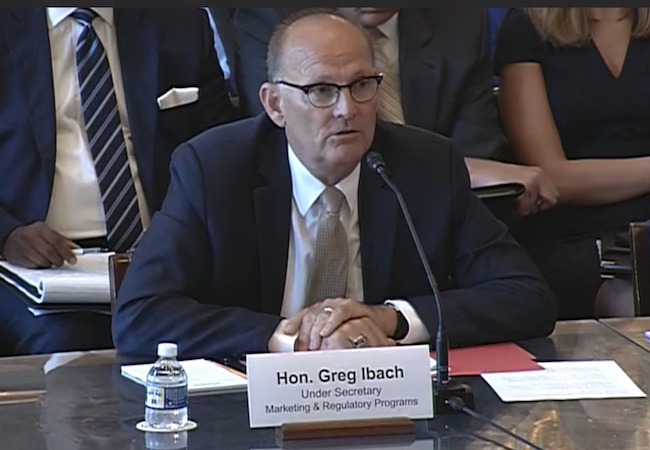
The First Step for GMOs to be Allowed in Organic is Public Discussion -- Which is Now Happening
(Former USDA official Greg Ibach testifying a House subcommittee hearing.)
How Organic Insider operates: We accept no advertising, we have no paywalls and we make our newsletters free to everyone because vital information about our industry needs to get out to as many people as possible. Please consider supporting our work, whether you are an individual or a company. Thank you so much.
For many of us, the idea of GMOs being allowed in organic is so utterly incomprehensible that it defies explanation.
Yet, if we look at what has transpired at recent government meetings, the organic community can no longer view this as an impossibility, given that this topic has been discussed on multiple occasions.
Greg Ibach (above), the former USDA Under Secretary for Marketing and Regulatory Programs, told a House Agriculture subcommittee hearing in 2019 that:
“There is the opportunity to open the discussion to consider whether it is appropriate for some of these new technologies, including gene editing, to be eligible to be used to enhance organic production.”
At the fall 2022 National Organic Standards Board (NOSB) meeting in Sacramento a few weeks ago, this issue was brought up again.
NOSB member Rick Greenwood said,
“Hopefully, I won’t get killed asking it, but do either of you (Jenny Tucker, Deputy Administrator of the USDA’s National Organic Program, and Jenny Lester Moffitt, the USDA’s Under Secretary for Marketing and Regulatory Programs) see a role for GMO in the future in the organic program? And the reason I say that is, we always think about GMO in terms of pesticide resistance, and I think there is more to it. There is root stock now that can grow in arid climates in high salinity soils, and my concern is for the organic program. We’re going to see expansion of agriculture in places like Africa, and the desert, that won’t be able to enjoy the benefits of organic processes. They won’t be able to be certified, so I know it’s part of the legislation, but even the Constitution was amended.”
“One of the problems is if you mention GMO in this community, you can be dead meat, and so it’s hard to get people to have discussions. I’ve mentioned it to some of my board colleagues and they say, I don’t know if you should even bring that up. It’s hard to get people to understand that there can be a GMO and a GMO, and I come from the human health background where equivalent of GMO is saving lives.”
Fellow NOSB member Jerry D’Amore responded to Rick Greenwood’s comments with:
“That was a wonderful go around. Rick, I applaud you for your question, and I think that what was just said is absolutely true. You said it is part of the dialogue, and you and I have talked about it a lot. You know my thoughts on it, too, which are sympathetic to yours. And now we started, and I thank you.”
I followed up with both NOSB members a few days ago to get more clarity on their comments.
“First, it is important to mention that I have been an organic avocado farmer for 15 years, and I believe in organic,” said Rick Greenwood. “My fear has to do with underdeveloped populations, in that they won’t be able to have organic crops without the use of GMOs. GMOs have been of great utility to vaccines and medications, and to not have a discussion about GMOs in organic is a real problem. Organic will be archaic. Organic cannot stop moving forward, just like the world doesn’t stop moving forward.”
Jerry D’Amore shared a similar sentiment.
“For the two of us, we are concerned that there is no room to talk about the broad benefits that GMOs could bring, including many that are overarching goals of organic agriculture. I do have fears that if we don’t stay abreast of what GMOs are and what they can do, organic could become significantly less able to adapt to changing climates and increased demand. If GMOs can provide a way to boost productivity and available nutrients, increase nitrogen-fixing bacteria, and reduce the need for herbicides and pesticides, is it not worthy of open-minded evaluation?”
NOSB MEETINGS NEED TO BECOME LIKE EXPO WEST
At the present moment, GMOs are prohibited in organic. However, the Organic Foods Production Act of 1990 does not specifically mention biotechnology, genetic engineering or genetically-modified organisms.
And it is unlikely that the USDA would make the unilateral move to allow GMOs in organic, something seemingly confirmed at the NOSB meeting in Sacramento.
There, the USDA’s Jenny Lester Moffitt deftly responded to Rick Greenwood’s question about GMOs in organic by saying, “I think this is a question that the community needs to tackle as a whole. And I am interested in how the community tackles that question.”
As such, if GMOs go past the discussion stage and are something that actually gets voted on — and ultimately recommended to the USDA — it would happen at the 15-member National Organic Standards Board.
Hopefully, this will motivate more organic brands to view the semi-annual NOSB meetings as just as important to their future as having a booth or walking the floor at Natural Products Expo West. Because if GMOs were ever allowed in organic, the USDA organic seal would suffer catastrophic harm, causing incalculable damage to brands.
“Modern ag technology, whether it is GMOs, hydroponics or CAFO dairy farms, is not about feeding the world or saving humanity. It is about control, money and power,” said Eliot Coleman, who has been farming organically since the 1960s at Four Season Farm in Maine. “Organic farming has prevailed against years of opposition because it works hand-in-hand with nature. Organic farming cannot be controlled or stopped because both it and nature operate independently of the industrial world. The principles of organic are timeless and never need to bend to the whim of current propaganda. Big Ag’s business plan is to convince people otherwise. ”
Our industry must send an immediate and forceful message to the National Organic Standards Board that genetically-engineered food has absolutely no place in organic.
The next National Organic Standards Board meeting will take place April 25-27, 2023 in Atlanta, Georgia.
 |
With gratitude, 
Max Goldberg, Founder |
Quick Hits
* LinkedIn News speaks with Patagonia CEO Ryan Gellert.
* The Grateful Dead has gone organic.
* Rodale Institute and Mad Agriculture are partnering to transition farms in America’s Heartland.
* Once Upon a Farm’s Jennifer Garner on her mission to feed kids in America with ‘A Million Meals.’
* GoodSAM and True Moringa are now offering a holiday shopping box sourced from Africa.
* Sempera Organics has launched Mamu — a ‘first-of-its-kind’ protein made from three species of mushrooms.
* Why Ron Finley is still ‘gangster’ about gardening.
* Neutral Foods is joining forces with FarmRaise to help distribute $1 million in funding toward carbon-reducing farm projects over the next year.
* Organic sparkling tea company Sarilla is sponsoring Fair Trade Finals, with the intention of getting fair trade products on college campuses across the country.
* Time to study up: 35 gardening terms everyone should know.
New Organic Products
Regenerative Tortilla Chips from Zack's Mighty
Zack's Mighty has introduced organic tortilla chips, made with corn that is Certified Regenerative by A Greener World. The company uses a rare heirloom flint corn and an authentic tortilla-first process, and the tortilla chips are available nationwide at Whole Foods Market, Sprouts, Wegmans and other retailers.Craft Instant Espresso from Blue Bottle Coffee
The latest innovation from Blue Bottle Coffee is Craft Instant Espresso. A custom process has transformed organic craft coffee into aromatic crystals, with the dimension and richness of espresso. Each jar includes 12 servings, and a package of 5 pre-portioned single-serve sachets will be available later this month.Energy Bars from JAMBAR
Jennifer Maxwell, founder of PowerBar and inventor of the energy bar category, is back with the launch of JAMBAR. These organic artisan energy bars come in four flavors -- Chocolate Cha Cha, Malt Nut Melody, Jammin’ Jazzleberry, Musical Mango -- and 50% of the company's after-tax profits will be donated to organizations that support music, active living and community connnections.Shelf-Stable Liquid Açaí Pulp from Tropical Açaí
New from Tropical Açaí is Açaí Bowl in a Bag. Instead of shipping frozen açaí around the country, this new innovation offers liquid organic açaí that can be stored at room temperature, saving valuable freezer space. Each soft-serve bag contains 20 servings and has a 12-month shelf life.
Weekly News Summaries

Historic Drought is Creating an Ongoing Crisis for Organic Dairy Farmers
Organized by Straus Family Creamery, the newly-formed Western Organic Dairy Farming Crisis Coalition seeks immediate emergency relief from federal and California officials to help save organic dairy farms. You can also sign the change.org petition here.
State Legislators Oppose Approval of Genetically-Engineered Mosquitos in California
Members of the California legislature are demanding a comprehensive review of the GE-mosquitos' potential impacts on public health and the environment -- before they get approved for release.

Glyphosate Residue Free Certification sees 21% Year-Over-Year Growth
By Steven Hoffman
The Detox Project reported that its Glyphosate Residue Free certification grew more than 20% in the past year to nearly $800 million, with more than 100 brands having been certified.
Lawsuit Challenges Restrictive and Unclear GMO Food Labeling Rules
Representing a broad coaltion, the Center for Food Safety filed an appeal against the USDA's misleading "bioengineered" terminology and for allowing the majority of GMOs to avoid labeling.
Mexican Lawmakers Push Wider Pesticides Ban
By Cassandra Garrison
Mexican officials continue to do the right thing for their citizens by banning more super-toxic pesticides.

SunOpta sees Oat Milk Sales Top Almond Milk for the First Time
By Keith Nunes
A significant event for both the company and the overall plant-based milk segment.

Organic Kids Lemonade Brand Poppilu is Acquired
By Mary Ellen Shoup
American Beverage Corporation, the owners of Juicy Juice and SUNNYD, purchased the brand for an undisclosed amount.

New Evidence Shows Pesticides Contain PFAS, and the Scale of Contamination Is Unknown
By Lisa Held
The EPA knows that plastic containers are leaching toxic ‘forever chemicals’ into pesticides. But PFAS are also ending up in pesticides from other sources -- in much higher quantities.

Paper Pots are Now Approved in Organic
By Kristen Leigh Lore
The USDA’s National Organic Program has added paper pots, a tool for farmers, to the approved substance list.

In the UK, Seasonal Fruit Pickers in Massive Debt After Being Sent Home Early
By Emiliano Mellino and Shanti Das
Nepali workers who quit jobs and borrowed cash to come to the UK are out of work just weeks after arriving. Heartbreaking story.
Want to share this newsletter on social media? You can use this link: Newsletter Link
The material in this newsletter is copyrighted and may be reprinted by permission only. All requests must be in writing. Please use our contact form to request republication rights.
Newsletter Archive
Quick Hits
* LinkedIn News speaks with Patagonia CEO Ryan Gellert.
* The Grateful Dead has gone organic.
* Rodale Institute and Mad Agriculture are partnering to transition farms in America’s Heartland.
* Once Upon a Farm’s Jennifer Garner on her mission to feed kids in America with ‘A Million Meals.’
* GoodSAM and True Moringa are now offering a holiday shopping box sourced from Africa.
* Sempera Organics has launched Mamu — a ‘first-of-its-kind’ protein made from three species of mushrooms.
* Why Ron Finley is still ‘gangster’ about gardening.
* Neutral Foods is joining forces with FarmRaise to help distribute $1 million in funding toward carbon-reducing farm projects over the next year.
* Organic sparkling tea company Sarilla is sponsoring Fair Trade Finals, with the intention of getting fair trade products on college campuses across the country.
* Time to study up: 35 gardening terms everyone should know.




